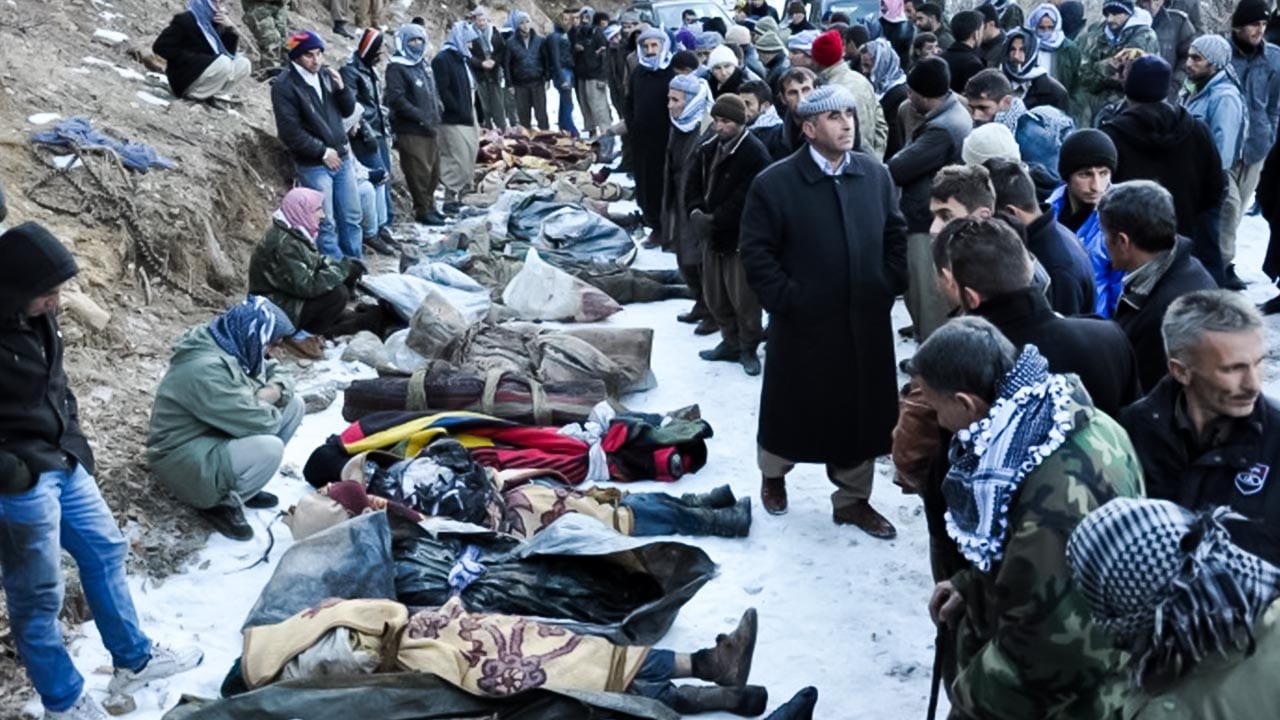Turkish fighter jets bombed 34 villagers in the Uludere (Roboski) district of Şırnak (Şirnex) in Turkey on 28 December 2011. Villagers, including children, were carrying fuel, tea and sugar to the other side of the border. Some accused villagers of smuggling to legitimise the murders. Cases filed in military and civil courts were subsequently dropped one by one. The European Court of Human Rights also rejected the case on the grounds that lawyers delivered documents two days after the deadline on 17 May 2018.
Therefore the judicial process has been tipped upside down. Veli Encü, brother of Serhat Encü, who lost his life during the bombardment, and Barış Encü, brother of Nevzat Encü, were imprisoned for their actions and statements. Several cases have been filed against the families of victims, accusing them of border violations, holding events, and brandishing photographs and banners.
34 are on trial
According to Sedat Yılmaz’s report for the Mesopotamia Agency (MA), the cases of 34 people, including former Peoples’ Democratic Party (HDP) deputy Ferhat Encü, were filed due to the protest against district governor Nafiz Yavuz. The charges of propaganda for a terror organisation, insulting army officials, and deliberate killing attempts, continue.
Another 16 families were tried in Şırnah High Penal Court for participating in the Uludere (Roboski) commemorations. Families were also fined between 1000 and 3000 Turkish lira (TL) for participating in the 500th day commemoration. Abdurrahman Encü, father of Bilal Encü, who lost his life during the bombardment, said, “The perpetrator is strong, but god is great!”

According to his mother, Halime Encü, Veli Encü was sentenced to five years in prison and served two years. Another five cases were also filed against him.
Barış Encü, Nevzat Encü’s brother, was also sentenced to six years and three months in prison due to posts on social media, and was imprisoned for around two years. Zeki Tosun, father of Mehmet Ali Tosun, who lost his life during the same incident, criticised the judicial system and said, “Cases were filed about each of us on the charge of insulting a patrol commander and the president because we buried our mortal remains side-by-side. Those cases still continue. Our green cards [cards for free treatment in hospitals] were suspended and I was fined 22,000 TL. I could not go out of the city for two years because of my speech against the press”.
The cemetery is closed to common prayer
Salih Encü’s mother Amina Encü revealed the oppression they were subjected to because they did not accept the case being covered up by indemnities. Stating that they were banned from praying together when they went to visit their children’s graves every Thursday, Amina Encü said, “They were always warning us and saying ‘We thought that they were terrorists and shot them, do not talk, do not sue’. We were going to visit our children’s graves but they were closing the road to block us. They were not letting us visit our children’s graves”.

Cases against victims, not perpetrators
Şirvan Encü’s mother Leyla Encü said, “They are taking us to the courts instead of the murderers of our children. What have we done? They killed our children. They fined each of us 3,000 TL because we went to the place where our children were killed. [President] Tayyip Erdoğan, wouldn’t you go to the scene if your child was killed in there? Even now, we, not the perpetrators, are engaged in a lawsuit”.
Tried for holding a banner
Selemi Encü’s mother Semire Encü has also been tried on the ground that she held a banner during the anniversary of the incident in 2015. She does not know what was written on the banner, and the case still contines. Semire Encü said, “34 people killed, but not even one person tried”.
‘The state is threatening us’
Fehime Encü, mother of Karker Encü, who was killed at the age of 16, criticised the judicial process: “After that incident, the state was always threatening us. They were threatening us as soon as we talked. We applied to several places to ensure the criminals were held to account, but we couldn’t get a result. Maybe we would feel some relief if even one of those responsible was punished. Our children were young and they were innocent. A great massacre and injustice was carried out. We did not deserve this. Tayyip Erdoğan’s wife came to see the situation. She saw the mountains. What kind of an income could we have in such mountains?”










